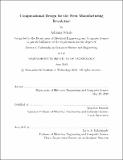Computational design for the next manufacturing revolution
Author(s)
Schulz, Adriana
DownloadFull printable version (31.62Mb)
Other Contributors
Massachusetts Institute of Technology. Department of Electrical Engineering and Computer Science.
Advisor
Wojciech Matusik.
Terms of use
Metadata
Show full item recordAbstract
Over the next few decades, we are going to transition to a new economy where highly complex, customizable products are manufactured on demand by flexible robotic systems. In many fields, this shift has already begun. 3D printers are revolutionizing production of metal parts in the aerospace, automotive, and medical industries. Whole-garment knitting machines allow automated production of complex apparel and shoes. Manufacturing electronics on flexible substrates makes it possible to build a whole new range of products for consumer electronics and medical diagnostics. Collaborative robots, such as Baxter from Rethink Robotics, allow flexible and automated assembly of complex objects. Overall, these new machines enable batch-one manufacturing of products that have unprecedented complexity. In this thesis, I argue that the field of computational design is essential for the next revolution in manufacturing. To build increasingly functional, complex and integrated products, we need to create design tools that allow their users to efficiently explore high-dimensional design spaces by optimizing over a set of performance objectives that can be measured only by expensive computations. In this work discuss how to overcome these challenges by 1) developing data-driven methods for efficient exploration of these large spaces and 2) performance-driven algorithms for automated design optimization based on high-level functional specifications. I showcase how these two concepts are applied by developing new systems for designing robots, drones, and furniture.
Description
Thesis: Ph. D., Massachusetts Institute of Technology, Department of Electrical Engineering and Computer Science, 2018. This electronic version was submitted by the student author. The certified thesis is available in the Institute Archives and Special Collections. Cataloged from student-submitted PDF version of thesis. Includes bibliographical references (pages 169-180).
Date issued
2018Department
Massachusetts Institute of Technology. Department of Electrical Engineering and Computer SciencePublisher
Massachusetts Institute of Technology
Keywords
Electrical Engineering and Computer Science.